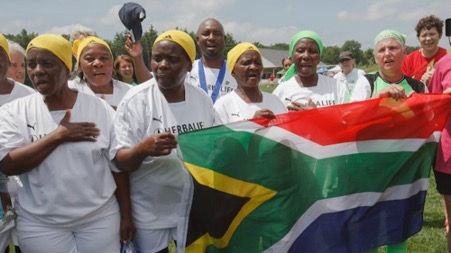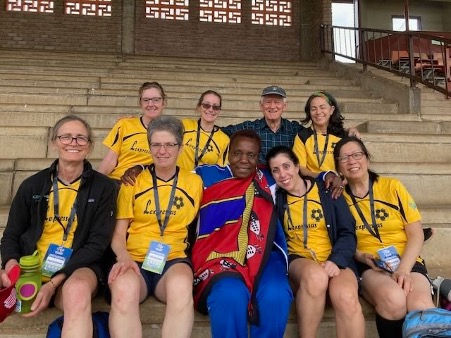How South Africa’s ‘Soccer Grannies’ inspired a global movement
- May 11, 2023
- 5 min read
Updated: May 15, 2023
From apartheid to America and from poverty to pioneers:
“These are women who lived through apartheid, poverty, hunger and lost children during the AIDS epidemic and but they are so resilient,” author of ‘The Soccer Grannies’ Jean Duffy tells the Women’s Sports Alliance.
“Their wonderful spirit has helped so many deal with what life throws their way.”

Soccer Grannies national singing anthem in 2010 - image courtesy of Tessa Frootko Gordon
Beka Ntsanwisi was just 35 when she was diagnosed with colon cancer but rather than be consumed by contemplations about her own condition, which would have been understandable, her thoughts instead turned to those around her in hospital.
She was surrounded by predominantly elderly women who were suffering from a variety of medical conditions, many of which she felt could potentially have been combatted by improving their day-to-day lifestyle.
After entering remission and upon release from hospital ‘Mama Beka’, as she is now affectionally known, formed regular exercise groups at local parks in South Africa.
By chance a football, kicked by a teenager playing with his friends nearby, rolled in their way and after one of the attendee’s attempt to kick the ball back to them resulted in the group erupting in laughter, an idea was formed.
Beka called the boys over and insisted they teach them how to correctly play the sport.
That moment in Limpolo Province, in 2007, marked the birthplace of Vakhegula Vakhegula, which roughly translates as ‘Grannies Grannies’ who became better known as a ‘the Soccer Grannies’ following an award-winning documentary.

Author Jean Duffy, who is an engineer by trade, would readily admit her experiences as a young woman in the United States were vastly different to those experienced by the South African pioneers.
However, she had never-the-less grown up in an era where women were rarely encouraged to take part in sport, let alone ‘soccer’.
“There were no girls’ soccer teams when I was at high school or college and I had no role models to look up to,” says Jean, who began playing in her 40’s.
“I was on the side lines watching my daughter's play and I thought ‘that looks like fun, I can run five miles and I’d like to try and put the ball in the goal!’
“Now it's 20 years I've been playing and it's my favourite time of the week because you make great friends, exercise, forget everything on your ‘to-do’ list and just have fun.”
AN ‘EXPLOSION OF EXPOSURE’ AT THE 2010 WORLD CUP

Beka Ntsanwisi - image courtesy of Tessa Frootko Gordon
Three years after that chance experience with a rogue ‘soccer ball’ in the park, football had become a serious focus for Beka’s group, known as Vakhegula Vakhegula Fooball Club, and they were attracting interest from across the country.
The 2010 men’s World Cup in South African provided the perfect springboard for a human-interest story of this nature to spark global media interest and outlets from across the world both absorbed and retold tales from the team.
Jean was captivated and became determined to bring them to the USA where age-group soccer was not only growing, but “booming” according to the American.
“I reached out and said to her that the United States Adult Soccer Association run a tournament every year and they should come over,” recalls Jean.
“Beka said right away, ‘you know we will come my sister’ but we had no idea the hurdles we would face in terms of getting passports, visas and raising the money.
“About a month before the tournament the New York Times ran an article about the ‘Soccer Grannies’ and the LA Times followed up a week later and through that coverage we were able to find a corporate sponsor willing to bring them over.”
While their performances on the pitch perhaps left a little to be desired, the women “wowed” onlookers from the moment they landed in Boston, dancing and singing their way through the airport.
“Their spirit was amazing,” Jean tells the WSA with a smile, as she recalls how they continued to show their passion and flair when cheering on other teams from the side lines.
“They didn't quite have the footwork to win the games, although they scored a few goals, but the winner of the over 60’s women’s division team gave them the trophy saying they ‘won the tournament for their spirit,’ so it was a very heart-warming experience.”
HOW AN ENGINEER BECAME AN AUTHOR
After the competition and returning to training with her team, the Lexpressas, in Lexington, Massachusetts, Jean’s coach quipped that which-ever player retired from their day job first should write about a book about the ‘Soccer Grannies’.
Jean became the ‘retirement pioneer’ in the group after leaving the world of engineering in 2015, but her transition to writer – and author – was far from straight forward.
“I had never sent anything more than emails,” she admits with a laugh.
“I first took a creative writing class in my town and then an editing class and slowly I've been chipping away at this project for eight years now!”
Recruiting researches in South Africa, who were able to conduct interviews with women in their native tongue, helped unearth not only fascinating stories, but also gave Jean more awareness of the socio-economic and historical challenges faced by the players.
“These are women who lived their lives through apartheid and the AIDS epidemic, with one woman losing five children to AIDS,” Jean states.
“Their stories and the resilience they have shown are incredible and they’ve worked so hard to help the next generation care for their children too. I just had to share their sprit with the world.”
A HISTORIC TOURNAMENT FIRST

Image from ‘Grannies International Football Tournament’ - Samsrec Productions
Despite the many achievements and services to her community, which have seen her dubbed the ‘mother Teresa of Limpopo’, there was one ambition that until earlier this year had eluded Beka – hosting a major tournament in her homeland.
In March 2023 that dream she wanted to “achieve before I die” was realised when her Foundation and football club hosted the first-ever Grannies International Football Tournament.
It was attended by 16 teams from across Africa, the United States and Europe.
“It was just a phenomenal event which brought together women over-50 who all shared this passion for football and showed fitness for older women is important,” remarks Jean.
“I've never played in front of five people, let alone a stadium with 5000 people so it really was an amazing experience and it helped spread the message even further.”

US Breakers hoist trophy - Ching Lai
TACKLING ‘WITCHCRAFT’ ACCUSATIONS IN SOUTH AFRICA
Jean’s book was released on 10 May and while she is coy about future projects, the American is keen to emphasise how Beka now has new challenges and targets ahead.
“She's got now almost 100 teams that she's inspired across South Africa and other African countries which is making such a different to these women's lives, but there are other areas she wants to help in and raise awareness about,” says ‘The Soccer Grannies’ author.
“One of the things that is kind of the hardest to for me to grapple with, is that women with dementia in South Africa, are sometimes accused of being witches, and even their lives are at risk.
“This one of the issues that Beka is dealing with and feel the most passionate about.
“She feels a need to keep these women safe, educate people about dementia, as well as mental health issues in South Africa and she'd love to build a retirement community for women.”
Before concluding Jean adds one more thought; “A dream Beka and I both share is to have a Grannies Soccer team in every country of the world. Wouldn’t that be something!”

Jean and Beka reunite with the Soccer Grannies in 2023 - Kate Duffy

